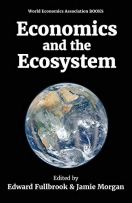From Herman Daly The basic issue of limits to growth that the Club of Rome did so much to emphasize in the early 1970s needs to remain front and center, with recycling considered as a useful accommodation to that limit, but not a path by which the growth economy can continue. Well before becoming physically impossible the growth of the economic subsystem becomes uneconomic in the sense that it costs more in terms of sacrificed ecosystem services than it is worth in terms of extra production. That richer is better than poorer is a truism. No dispute there. But is growth in GDP in wealthy countries really making us richer by any inclusive measure of wealth? That is the question. I think it is likely making us poorer by increasing unmeasured “illth” faster than measured wealth. Even a
Topics:
Editor considers the following as important: Uncategorized
This could be interesting, too:
tom writes The Ukraine war and Europe’s deepening march of folly
Stavros Mavroudeas writes CfP of Marxist Macroeconomic Modelling workgroup – 18th WAPE Forum, Istanbul August 6-8, 2025
Lars Pålsson Syll writes The pretence-of-knowledge syndrome
Dean Baker writes Crypto and Donald Trump’s strategic baseball card reserve
from Herman Daly
The basic issue of limits to growth that the Club of Rome did so much to emphasize in the early 1970s needs to remain front and center, with recycling considered as a useful accommodation to that limit, but not a path by which the growth economy can continue. Well before becoming physically impossible the growth of the economic subsystem becomes uneconomic in the sense that it costs more in terms of sacrificed ecosystem services than it is worth in terms of extra production. That richer is better than poorer is a truism. No dispute there. But is growth in GDP in wealthy countries really making us richer by any inclusive measure of wealth? That is the question. I think it is likely making us poorer by increasing unmeasured “illth” faster than measured wealth. Even a steady-state economy can be too big relative to the ecosphere. The neoclassical circular flow picture can never be too big by virtue of its being an isolated system. However, neoclassical economists do recognize that the economy can grow too fast (over-allocation of resources to investment relative to consumption), even though its scale can never be too big.
Inevitably national growth economies reach a point where many citizens begin to suspect that growth is no longer worth the cost of excessively rapid adaptation to an accelerating economy of no return – that so-called economic growth has in reality become uneconomic growth. John Stuart Mill recognized that long ago. Why have not more recognized it? Why is growth still the summum bonum of economists and politicians? Probably because growth is our substitute for sharing as a cure for poverty. And because our national accounts (GDP) are incapable of even registering uneconomic growth because they count only value added by labor and capital, and omit entirely the cost of using up that to which value is added, namely the entropic flow of natural resources, the very sap of life and wealth.

